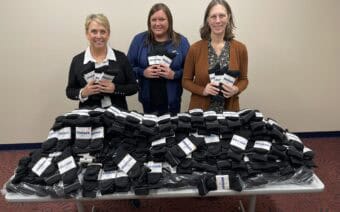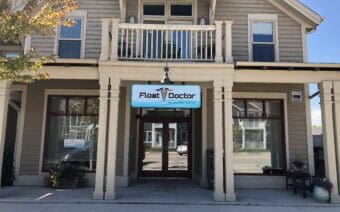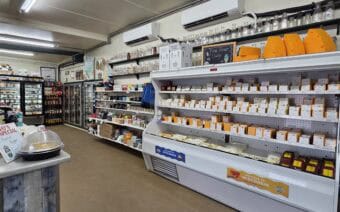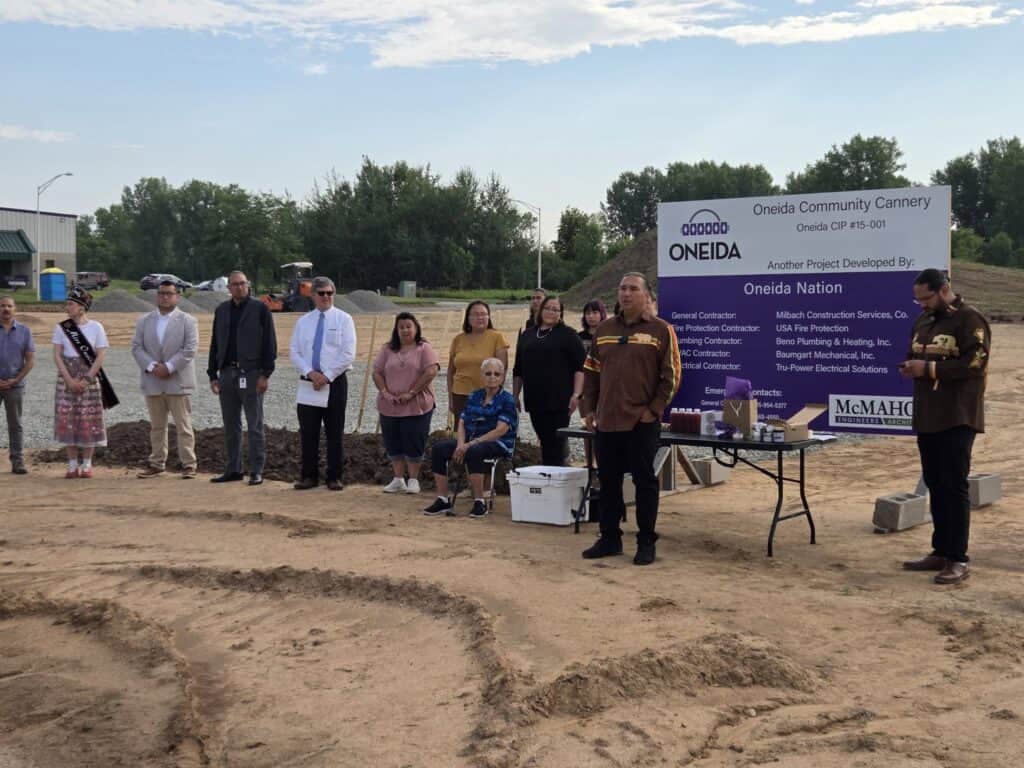
September 8, 2025
ONEIDA – After 47 years, the Oneida Community Cannery will soon be relocating.
Since its founding, Vanessa Miller – Oneida Nation food and agriculture area manager – said the cannery has played a vital role in supporting food sovereignty for the Oneida Nation.
At the heart of its mission, Miller said, is a commitment to tribal culture, offering programs, services and resources that empower citizens and strengthen the Oneida Nation community and beyond.
Miller said the Oneida Nation has an integrated food system that encompasses initiatives such as nutrition education, assistance programs and food security.
However, in addition to these programs, she said the Tribe also empowers its community members to engage in self-gardening, self-ag production and self-food production.
“It’s a means to meet the immediate needs of membership,” she said. “It strengthens and reconnects that pathway back to our indigenous food pathways.”
Miller said the cannery has been in operation since 1978 and has been a critical part of the Tribe’s integrated food system since the start.
What began as a small-scale effort to introduce food preservation to the community, she said, quickly gained momentum.
With the community embracing the cannery and backing from Oneida leadership, Miller said things took off.
As a result, she said the cannery’s programming has “boomed” over the past four decades.
Currently located in the Norbert Hill Center building, Miller said, with its rapid growth, the cannery – which is open for use to the public – has outgrown that space exponentially.
“We’re busting at the seams with our current location,” she said. “We’re trying to do production to meet the needs of our community, while also doing programming, community engagement, outreach and workshops all in a small space. The facility’s physical assets are not meeting the needs of our current programming, let alone all the future of where we really want to go.”
Miller said she credits the community’s shared mindset and progressive attitude toward food – seeing it as more than sustenance, but as a source of healing, strength and tradition – as the driving force behind the need for a larger space.
Food awareness
When asked if the cannery’s work anticipated today’s growing focus on food awareness, Miller said she doesn’t believe the goal was to lead a new movement.
Instead, she said it built upon one that already existed within the community – reviving a connection to food, its meaning and the teachings of the elders, so they could be passed on to future generations.
At the same time, Miller said that’s where the paradox lies.
“When it comes to food systems and how we look at them now, it’s really a systems change and a mindset shift when it comes to how we look at our food,” she said, “because it’s not how society generally has a relationship with food.”
In the Oneida Nation community, Miller said food is not just a transactional thing – and so much more than “macros, micros, calories and so on.”
The modern food system, she said, has blurred the meaning of “healthy,” creating markets around ever-changing definitions.
This confusion, Miller said, leaves many disconnected from real nourishment.
That, she said, is where the Oneida Community Cannery steps in – reconnecting people with ancestral knowledge and redefining health on their own terms.
“Our efforts here are trying to simplify food back to its intended purpose, minimizing processed foods and eating whole foods,” she said. “It makes us think about the way we grow and manage our resources – having that reciprocal relationship with our food relatives, land, the waters, the air. It’s got to be done responsibly and in accordance with our original instructions as Oneida people.”
Miller said she and those who have carried this work forward over the years understand that food sovereignty means giving people the tools to take control of their health and allow them to create their own solutions.
Beyond nutrition
Miller said the Oneida Community Cannery is about more than just community and public health awareness – it’s about building community wealth, too.
By spending within the local economy, Miller said it supports and empowers the community, ensuring people understand the impact and power of where their dollars go.
“It’s such a broad-ranging thing,” she said. “This isn’t just dietetics. We’re trying to look at a systems change within it all.”
With food playing a central role in the identity of all people, Miller said the Oneida Nation isn’t alone in its efforts, as many other tribal communities are doing “amazing things” in food sovereignty.
Within the Oneida Nation community specifically, Miller said there is a concentrated effort to advocate for policy change to expand food programming and agriculture initiatives.
“This new center has been a long time coming,” she said. “This isn’t something that was just grabbed out of the air recently. The parts that were needed all fit together for it to culminate at this point.”
Miller said American Rescue Plan Act (ARPA) funding awarded during the COVID-19 pandemic played a key role in that.
At the time, she said Oneida Nation leadership championed food sovereignty as essential to overall well-being and allocated a significant portion of ARPA funds to support large-scale projects that promote long-term food sovereignty.
During the pandemic, Miller said leadership was able to see the gaps in the system, which allowed them to objectively self-assess and make great strides to make a new building happen.
The new digs
Breaking ground on the project last month, Miller said the estimated completion is the end of June 2026.
She said the facility – which will be located at N. 7360 Water Circle Place – will be around 11,000 square feet, offering a back-of-house processing side (which is not publicly accessible) and a front-of-house programming side.
Miller said the up-to-date, USDA-code-approved facility will have temperature-controlled rooms and cold storage, which is a major need right now.
She said it will also include a small, community-facing retail outlet.

Miller said what makes this space truly unique – calling it the “really cool part of the design” – are the two demonstration kitchens that mirror each other.
“It will double [our capacity to provide] food-related programming,” she said. “[We] will be able to facilitate and house different classes and workshops on preservation, processing – ‘food is medicine’ type of programming.”
Beyond its initial offerings, Miller said the space will also host certification classes in food safety and handling, workforce training and internships.
She said she also envisions an entrepreneurial incubation hub where community members who lack physical storefronts – a common barrier to starting a business – can develop their products and business skills.
Those ideas, Miller said, will be further hashed out in the coming months.
A community abuzz
Miller said she’s grateful to be part of a community that continues to embrace and consume traditional foods – a commitment that continues to fuel the need for this facility.
Though prioritizing the needs of tribal members remains central, Miller said the Oneida Community Cannery is actively collaborating with partners – from local technical colleges and UW Extension programs to other tribal nations – to extend services to the wider community.
Miller said the new cannery facility is designed to be a space where Oneida Nation members and the broader community can keep tradition alive and strengthen cultural identity in a meaningful and dynamic way.
“We have a plethora of opportunities to learn from and with the community,” she said. “The knowledge that exists here is incredible. We’re really excited for that component to hold its own dedicated space. We’re really looking forward to this being a space if it can provide any sense of facilitation to mending the disconnect.”
In her role as the food and agriculture area manager for Oneida Nation, Miller said ongoing evaluations of programs and services have helped identify where the Oneida Nation can better meet community needs and close existing gaps.
The vision for the new center, she said, aims to bridge those gaps and help the community rediscover the healing power of food.
 Black & White: An ode to the sustainable black and white Holstein cow
Black & White: An ode to the sustainable black and white Holstein cow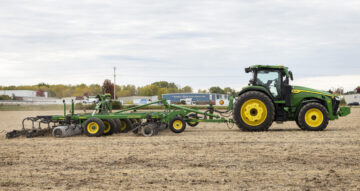 FVTC students get a first look at AI-powered tractor
FVTC students get a first look at AI-powered tractor


